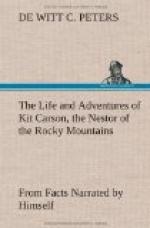[Footnote 14: William Williams was a most celebrated character in the Rocky Mountains, where he lived for many years. At one time he was a Methodist preacher in the State of Missouri, which he frequently boasted of in after life. Whenever relating this part of his eventful career, he used to say that he was so well known in his circuit, that the chickens recognized him as he came riding past the farmhouses. The old chanticleers would crow “Here comes Parson Williams! One of us must be made ready for dinner.” Upon quitting the States, he traveled extensively among the various tribes of wild Indians throughout the far West and adopted their manners and customs. Whenever he grew weary of one nation he would go to another. To the Missionaries, he was often very useful. He possessed the faculty of easily acquiring languages and could readily translate most of the Bible into several Indian dialects. His own conduct, however, was frequently in strange contrast with the precepts of that Holy Book. He next turns up as a hunter and trapper; when, in this capacity, he became more celebrated for his wild and daring adventures than before he had been for his mild precepts. By many of his companions, he was looked upon as a man who was partially insane. Williams proved to be a perfect enigma and terror to the Mexicans, who thought him possessed of an evil spirit. He once settled for a short time in their midst and became a trader. Soon after he had established himself, he had a quarrel with some of his customers about his charges. He appeared to be instantly disgusted with the Mexicans, for he threw his small stock of goods into the street of the town where he lived, seized his rifle and started again for the mountains. His knowledge of the country over which he had wandered was very extensive; but, when Colonel Fremont put it to the test, he came very near sacrificing his life to his guidance. This was probably owing to the failing of Williams’ intellect; for, when he joined the Great Explorer, he was past the meridian of life. After bequeathing his name to several mountains, rivers and passes which were undoubtedly discovered by him, he was slain by the red men while trading with them.]
[Footnote 15: Five years ago this settlement contained, about thirty inhabitants, mostly Mexicans. It was frequently subjected to various kinds of annoyances from Indians. On one occasion it was attacked by the hostile Utahs and Apaches, who killed and carried off as prisoners a total of sixteen settlers. Among the slain was a Canadian who fought so skillfully and desperately before he was dispatched, that he killed three of his assailants. When his body was found, it was literally pierced through and through with lance and arrow wounds, while the hand, with which he had caught hold of some of these weapons, was nearly cut to pieces. Around his corpse, there were a dozen horses’ tails which had been cut from the horses which were owned by the dead warriors, and left there, as a sign of mourning, by the Indians.]




